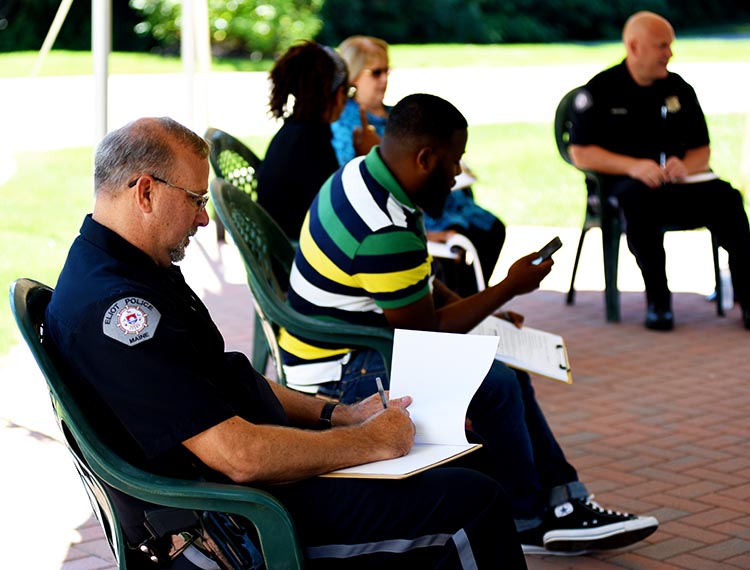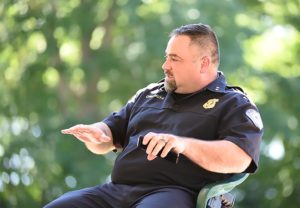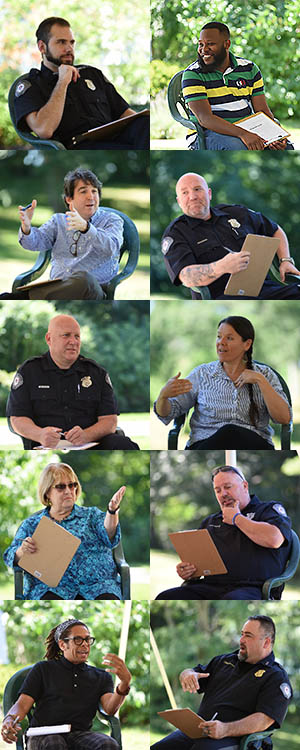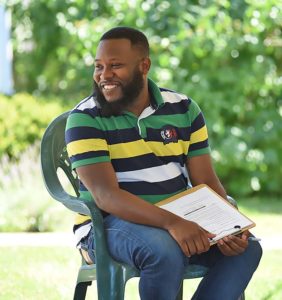



By Leslie Farrell
In Eliot, Maine, deep discussions on racial justice between police officers and Green Acre Baha’i School staff have been building bridges and changing hearts.
Grounded in the principles of humanity’s spiritual nature and essential oneness, these conversations have expanded to include county legal officials. Elliot Moya, chief of police, and Najee Brown, Green Acre’s artist-in-residence who is directing performances and dialogues on Black experiences, are among participants who say the ongoing dialogue has been challenging and rewarding.

The dialogue began four years ago, shortly after Moya’s appointment as chief. When staff members at Green Acre, a Baha’i center of learning, went to meet him, the response was so positive it was followed by a series of conversations with him individually and with the eight other members of the police force.
“We tried to figure out what we have to offer,” says Robert Sapiro, Green Acre administrator. “We aren’t diversity trainers. We realized what we can offer is the concept of the oneness of humanity and the idea of the nobility of every human soul. … Because our approach is about the oneness of humanity, we all have to solve this together,” Sapiro says. “It gives us the ability to have conversations without anyone feeling demonized. People can see things in a slightly different way because they don’t feel like they are being attacked.”
“Great conversation,” then the stakes rise
At their first meeting, Moya says, he and his team had almost no knowledge of Green Acre or the Baha’i Faith.
“It was just a great conversation. … We went back and forth about their experiences and our experiences. It was very rewarding,” Moya says. People got to know each other over a barbecue afterward.
Then in May 2020, the killing of George Floyd by a Minneapolis officer proved a catalyst. While conversations had “touched on race a little bit” before then, discussion topics became firmly centered on racial equity from that point.
“It was a strange kind of moment,” Moya says. “There was fear for my job, almost a panic; I felt conflicted. Here I am in law enforcement, I got in it for good reasons, and now there’s this.”


Police were getting training to address implicit bias, yet Moya saw a need for the discussion to go deeper. And the experience still needed to be encouraging for the officers, “who I’d known for a while and who I think are good people.”
In his vision for “genuine” conversations, he says, “I want officers to be able to ask questions, to have a resource they can go to. I had no idea how I was going to lead through this.”
The officers and a diverse handful of Green Acre staff members started with three sessions, each with a theme: inspiration; individual and collective vision of humanity’s future; and mission — personally and for the police department. For guidance, they referred to some Baha’i writings on the topic.
Sapiro recalls, “We wanted to try to create an environment where they saw themselves as protagonists moving along the path [toward greater understanding of racism]. We wanted them to see that they are already on the path.”
Everyone was nervous starting the first session, Moya says. But within 10 minutes everyone was joking and laughing.
Understanding of the need builds
The town of Eliot is 97 percent white, and the police force is 100 percent white. Moya is of Puerto Rican descent. In the beginning, some officers didn’t see the need for meetings about racial equity. They wondered if and how they would be impacted by the country’s focus on racial justice. These conversations, in large and small groups, have helped them answer those questions.
“We looked at it through the lens of the Baha’i teachings,” Moya says, “and the topic morphed into topics of race. The officers found themselves in a safe space where they could ask questions they didn’t understand.”
As one example, an officer came in disagreeing with the National Football League’s proposal to play “Lift Every Voice and Sing” — known as the Black national anthem — regularly at games. Discussion with the group changed his mind, as he heard others’ experiences and ideas.
Later, officers “came in and out of my office saying ‘I get it.’ None of us got into police work to be racist, but nobody understood systemic racism. These are important things to know, to be empathetic,” Moya says.
He felt “like a proud papa” when an officer who had missed a session came into his office and wanted to know what was discussed. “[He] said, ‘You know, I’ve lived in the woods in Maine my whole life. I guess I don’t know what I don’t know.’ … He wants to know.”
Green Acre staff members also feel the power of the discussions. “Some of the officers started sharing about what they have to think about when they arrest someone — so much pressure … we never would have thought of it,” Sapiro says.
Perspectives are challenged
Brown, the artist-in-residence, says, “Some of their perspectives and mine have been challenged, and that wouldn’t have happened had we not had these conversations.


“I’m a Black man from Brooklyn; I’ve never had positive interactions with police officers. … As a kid, if someone said they were calling the cops, the kids started crying because they thought something bad would happen,” Brown says. “Working with the police department was very important to deal with my own bias.”
Seeing the officers dealing with their bias was also powerful for Brown. “There was a lot they didn’t understand about the lives of African Americans. The only experiences they’d had was with the few that live up here or what they see on TV.”
One of the officers said he hated Black Lives Matter, but he later realized that just because he hasn’t experienced racism doesn’t mean it doesn’t exist. “He and I had some dialogue. He challenged me with all of his questions. Us being patient with each other — being able to hear each other — he came to a different conclusion.”
Moya points out that social justice wasn’t ignored as a topic before, but it wasn’t discussed in their daily lives. “We just didn’t know things. … We aren’t done with the conversation.”
Into the legal system
When Rockingham County Attorney Patricia Conway heard about Brown speaking in a webinar on the dialogue with Eliot police, she was inspired to do something similar. Green Acre staff, along with Moya and a couple other police officers, have had six sessions with her and her department, which includes 20 attorneys, four victim advocates and two investigators.
Their office struggled with much the same issues as the police force when the national discourse on racial bias came to the fore, says Deputy County Attorney Melissa Fales. In a workplace filled with differing opinions, the topic of racism was anxiety-producing. “We just were at a loss of what to do. A lot of us acknowledged we needed to take some action,” she says.
Fales says having help from the Green Acre staff opened doors of communication. They were impressed from the start, especially with Brown’s contributions to the dialogue and his work with police.
Fales says the end result has been beyond their expectations. “I really did feel like I learned a lot about my co-workers and am able to have a more frank discussion about this sort of thing and carry it forward into our day-to-day life, and so going forward we don’t steer away from difficult conversations,” she says.
“I can’t say enough great things about things they did. … We hope this is the first step in a process toward more tangible things we could be doing,” Fales adds.
The police department recently held a swearing in ceremony for its sergeant at Green Acre. “It’s just a good, positive place,” Moya says.


![]()
![]()
Whether you are exploring the Bahá'í Faith or looking to become an active member, there are various ways you can connect with our community.
Please ensure that all the Required Fields* are completed before submitting.